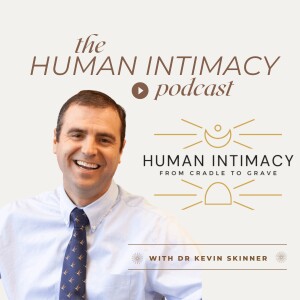
Wednesday Mar 26, 2025
Learning to Regulate Difficult Emotions: A Key to Thriving Relationships (Episode #59)
🎙️Learning to Regulate Difficult Emotions:
A Key to Thriving Relationships
In this powerful post-conference episode of The Human Intimacy Podcast, Dr. Kevin Skinner and MaryAnn Michaelis explore one of the most essential skills for emotional and relational well-being: affect regulation. Building on their recent discussion about resentment, this episode dives deeper into what happens when emotions become intense and overwhelming—and how we can respond skillfully, both individually and in our relationships.
Dr. Skinner and MaryAnn reflect on the lasting impact of the Human Intimacy Conference and shift into a grounded, thoughtful discussion about what causes emotional dysregulation, how our childhood experiences shape our emotional responses, and how to build the capacity to sit with and soothe difficult emotions. They emphasize the importance of self-attunement—the ability to recognize and regulate your own emotional state—and co-regulation, the process of calming and connecting with another human being.
MaryAnn shares insight from her background in music to explain how attunement works in relationships, and Dr. Skinner brings in science-based practices, including coherent breathing, attachment theory, and trauma-informed care. Together, they offer clear, compassionate steps for how to become more emotionally resilient, attuned, and connected.
---
📚 Key Concepts & Resources Discussed:
1. Affect Regulation Theory
- Based on Daniel Hill’s book *Affect Regulation Theory
- Regulated emotions = greater flexibility, calm, and relational effectiveness
2. Childhood Conditioning and Emotional Roles
- What we learned about emotions growing up shapes how we respond now
- Many people learned to hide or suppress emotions to stay safe
3. Self-Awareness & Attunement
- Learn to identify dominant emotions through reflection and body awareness
- Use tools like the Feelings Wheel and body scans to build emotional vocabulary
4. Co-Regulation in Relationships
- Eye contact, tone of voice, and presence all help regulate others
- Safe relationships can powerfully soothe emotional distress
5. HeartMath & Coherent Breathing
- Monitoring and lowering heart rate through intentional breathwork
- Self-regulation begins with learning to calm the nervous system
6. Physical Health & Emotional Resilience
- Sleep, nutrition, and exercise are foundational for affect regulation
- Emotional regulation improves when we care for the body
7. Dr. Bessel van der Kolk – The Body Keeps the Score
- Emphasizes group-based healing through music, dance, and movement
8. ADHD & Adaptation
- Recognizing unique regulation needs, such as background sound or movement
9. Mindfulness & the Brain
- Richard Davidson’s research on the neurological benefits of meditation
- Emotional presence strengthens with consistent mindfulness practice
10. Emotional Tolerance & Resiliency
- Being able to sit with and name difficult emotions reduces reactivity
- “You name it to tame it” – labeling emotions builds tolerance
11. Reframing Survival Skills
- Many coping strategies (like music, creativity, nature) are regulation tools
- Recognizing what already works and building on those strengths
---
💡 Takeaway Message:
Emotional regulation is not an inherited trait—it’s a learned skill. Whether you’re trying to manage your own inner world or support someone you love, learning how to identify, tolerate, and soothe difficult emotions is foundational for well-being. With awareness, intention, and support, we can all build these skills—and offer the gift of calm and connection in our most important relationships.
No comments yet. Be the first to say something!